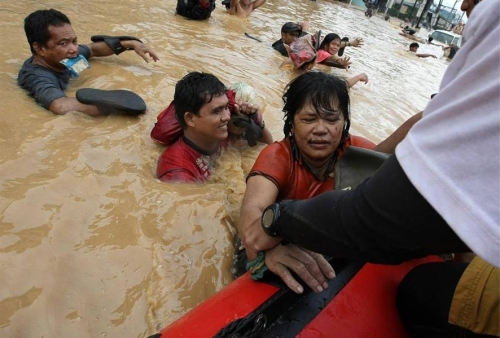Here's an
article by Ramon Tulfo that explains quite well why Filipinos are posing and smiling after the hostage crisis last Monday.
According to Ramon Tulfo.
The reason bloody incidents like the one at Rizal Park and tragedies such as typhoon “Ondoy” keep recurring is that Filipinos take misfortunes like a joke.
We make jokes about other people’s miseries and mistakes.
One day after the Rizal Park incident, jokes about the bumbling cops involved in the rescue started circulating.
The acronym SWAT (Special Weapons and Tactics) had taken on different meanings:
Sorry We Aren’t Trained.
Sugod, Wait, Atras, Tago (Attack, Wait, Retreat, Hide)
Sana Wag Ako Tamaan (Hope I don’t get hit)
Sobrang Wala Akong Training (I’m very much ill-trained)
Here’s a wry comment from a friend about the incident: “The Luneta massacre shows that our policemen are trained for HOSTESS-TAKING, not hostage-taking,” an obvious reference to cops who raid sleazy bars and force bar girls to have sex with them.
The Manila Police District was once known as “Manila’s Finest.”
According to the current joke, it is now the “Philippines’ Worst.”"I think it speaks more about the nature of the Filipino than being insensitive about the situation. That's why it is said that the Filipinos are always happy. Even in a tragic situation, they can manage to smile.
To be honest, I have a feeling that "depression" doesn't even exist in the Philippines. People may say they're depressed, but the next day, they're happy and smiling. Which is why for the longest time, I could never understand why there was an illness called depression on American TV because I've never seen it in the Philippines.
It's in the nature of the Filipinos to treat everything as a joke. Why? Perhaps it's an outlet so as not to add to their misery. Perhaps it is the Catholic teaching that God will provide. Maybe we've just been desensitized about events like these that we hardly feel any misery in tragic situations. I don't know, but I've seen so much blood and death on Philippine TV news that it doesn't freak me out anymore.
Just try to watch TV Patrol or GMA News, they actually show the victim's bodies and blood. You hardly see that in foreign news channels like CNN. If you see blood and gore regularly, it's no wonder the people there see the bus massacre as a photo event instead of shock and sadness.
As a Filipino, I am sad and embarrassed by what those cops and students did having a photo op after the incident. It was insensitive and inappropriate. But can you really blame them?
Case in point, here are some photos of Typhoon Ondoy's victims.



Judging by the photos, it doesn't seem like it was such a miserable situation to have lost your home and belongings in a flood doesn't it?






Comments